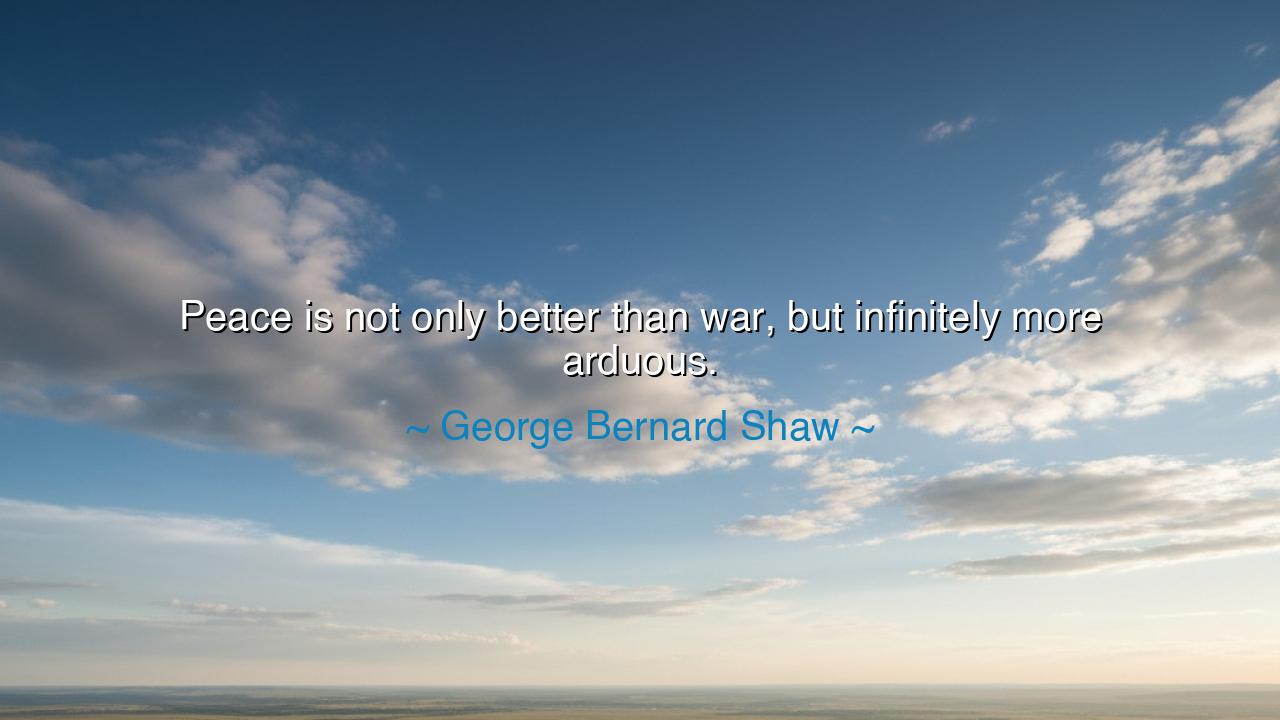
Peace is not only better than war, but infinitely more arduous.






The words of George Bernard Shaw — “Peace is not only better than war, but infinitely more arduous.” — strike with the weight of a hammer upon the anvil of human history. In them lies a paradox: that while peace is the noblest treasure of nations, it is also the hardest to forge. For war bursts forth with fire and fury, born of passions untamed and instincts ungoverned, but peace demands discipline, sacrifice, patience, and the higher courage of restraint. Shaw unmasks the truth that the path of violence is quick and brutal, while the path of harmony is long, thorned, and demanding.
To wage war requires only the yielding to impulse: anger, greed, or vengeance. A word insulted, a border crossed, a resource desired — and the swords are drawn, the cannons roar. But to sustain peace requires the mastery of self, the bridging of divisions, the careful tending of wounds that do not heal in a day. It demands not the roar of armies, but the quiet labor of statesmen, healers, mothers, teachers, and citizens, all guarding against the ever-creeping shadow of hatred. Thus Shaw declared it “infinitely more arduous,” for what is harder than governing the human heart?
History proves his words again and again. Consider the Congress of Vienna in 1815, when Europe, exhausted from the flames of Napoleon’s wars, sought to rebuild. It was not a simple feat. Suspicion clouded every hall, vengeance lurked in every heart, and compromise was bitter as gall. Yet through patience, negotiation, and the courage to yield pride, they achieved a fragile peace that endured for nearly a century. That peace was no accident, but the fruit of labor far more demanding than the swift clashes of war.
Or recall the long struggle of South Africa, where decades of blood and oppression left wounds deeper than stone. When Nelson Mandela and Desmond Tutu turned from vengeance to reconciliation, they chose the harder road. To fight would have been easier; to forgive was arduous. To embrace one’s enemy, to sit across from those who once inflicted pain, required a heroism greater than any soldier’s. Yet by such courage, a nation was reborn. Their story reveals the eternal truth: peace is harder than war, but it is better beyond measure.
Shaw’s words also speak to the individual heart. Within each person lies a battlefield where anger and compassion, pride and humility, justice and mercy contend. To lash out when wronged, to strike in word or deed, is simple. But to master oneself, to answer anger with patience, to hold the tongue, to forgive when pride screams for vengeance — this is the truest labor of the spirit. Each of us, in our small way, must learn that peace is no passive state, but the active work of every moment.
The lesson is clear: do not mistake peace for ease. It is not the absence of conflict, but the presence of effort. It demands watchfulness, discipline, and endurance. To build a house of peace is like building a temple stone by stone, while to destroy it by war is to strike it down with a single torch. Choose the harder labor, for though it taxes the body and soul, it yields fruits that endure: stability, justice, harmony, and the flourishing of generations.
Practical steps follow. In your own life, when conflict arises, take the harder path: listen before speaking, forgive before retaliating, seek common ground before dividing. In communities, nurture dialogue where anger festers. In nations, support those who labor for diplomacy, who resist the temptation of quick violence. Understand always that true peace is not weakness, but the greatest form of strength, for it requires mastery over the very forces that drag humanity toward destruction.
So remember, child of tomorrow: war is a fire that devours quickly, but peace is a garden that demands endless care. It will weary you, it will test you, it will call upon your deepest reserves of patience and courage. Yet it is better, infinitely better, than the flames of destruction. Walk the arduous path, and you will not only preserve the present, but plant seeds of hope for all who come after.






AAdministratorAdministrator
Welcome, honored guests. Please leave a comment, we will respond soon